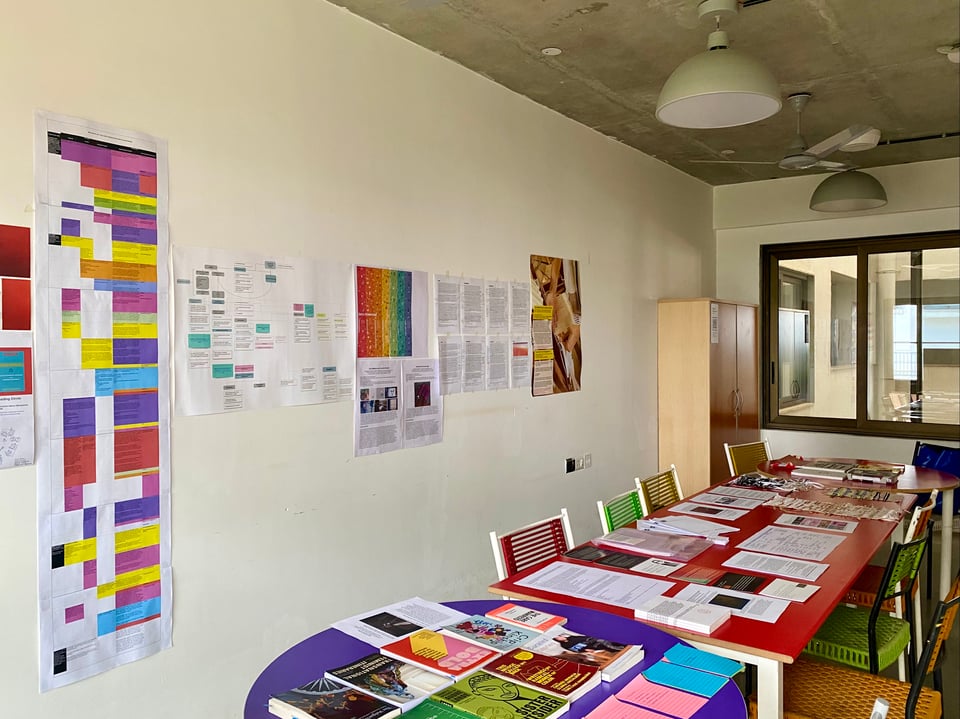A Digital Humanities Lab
Felt Notes

This letter comes to you via Buttondown, a simple and lightweight letter creation tool, to which I migrated last month after considering a number of comparable choices available to those of us seeking intimate readership. Individuals may now access the Felt Notes archive and its updated subscription link via the About section below.
As the new year begins, the Co-lab is welcoming wider members from campus as well as those with other institutional and community affiliations to its space. This month, for example, it was wonderful to introduce Dr Kim Munro, who is visiting SMI from the University of South Australia, to the work of the lab across its pedagogical formats: workshops, studios, seminars, and talks. Over a cup of coffee, we discussed what this process of integrating research and teaching, as well as orienting students to critical discourses at the intersections of technology, culture, and society has entailed—and what role has the lab played in grounding students’ creative and scholarly inquiries in their respective disciplinary concentrations. The various syllabi, project worksheets, made objects, and term reports served as helpful materials to think with, as well as for me to reflect upon what a digital humanities lab might continue to do and feel like.
This semester, the lab is also home to two postgraduate (PG) students from Human-Centered Design pursuing their Capstone projects in conversation with its ongoing feminist inquiries and projects spaces. Navya S. is currently working on questions of data privacy and protection involving on-campus student populations through a feminist lens, implicating conventions of digital identity, safe space, and feminist internet in her research-creation process. Sowmya C. is researching the form, role, and meaning of storytelling in shaping and surviving girlhood in association with city-based networks and curated reads involving a bookstore, a community library, and an independent publisher.
Furthermore, this semester I am extending the lab into two distinct seminar spaces for postgraduate and doctoral students respectively. The first course, a graduate-level theory and understanding seminar on the Future of Human and Digital, will engage scholarship on practices connected to Prototyping; Producing Speculative Fiction/Non-Fiction; Art Making; Archiving; Coding; Teaching and Learning; and Writing and Publishing. Each of these practices will cover a week and be read against three interrelated framings of the Future as Techno-Utopia; Community; and Technological Self. The second course, a doctoral studies elective on Feminist and Queer Worldbuilding, will begin with a selection of artifacts that invite us to consider what might constitute feminist and queer engagements with art, architecture, and design in history and theory. In doing so, we will a) orient ourselves to sites and embodiments of queer-feminism as resistance (Puar), refusals (Ahmed), and renewal (Muñoz) for collective worldmaking through time [1]; and b) interrelate cross-disciplinary texts, technologies, archives, and practices to further an intersectional analytic for naming and aligning with debates and desires viewed as peripheral to everyday life.
Notes
[1] Puar, Jasbir K. 2017. The Right to Maim: Debility, Capacity, Disability. Durham: Duke University Press; Ahmed, Sara. 2006. Queer Phenomenology: Orientations, Objects, Others. Durham: Duke University Press; Muñoz, José Esteban. 2009. Cruising Utopia: The Then and There of Queer Futurity. New York: New York University Press.
Opportunities
+ Call for Applications: Just Tech Fellowship 2024 (Deadline: January 31, 2024)
+ Call for Participation: Digital Humanities Summer Institute (DHSI) 2024 at the University of Victoria, Victoria (Early Registration Deadline: April 1, 2024 / Regular Registration Deadline: June 1, 2024) / Full tuition scholarships are still available for a number of courses and the deadline to avail this scholarship is February 14, 2024.
About
Felt Notes are monthly dispatches about the work of the Just Futures Co-lab, and the co-labouring worlds of research and teaching in art, design, and the digital humanities that it scaffolds, furthers, and amplifies. The letter writing translates the ever so negotiated nature of this space at the Srishti Manipal Institute and the discourse and scholarship on equity and justice we produce through critical pedagogy; archives and databases; interactive digital storytelling; and inquiries into queer-feminist media technologies and infrastructures.
I hope reading this letter and its upcoming segments are a meaningful experience for you. If you aren’t subscribed yet, you may do so here. If you are already subscribed, I would love for you to share the link with friends and trusted networks as we make sense of our relationships to technology as well as our relationships to each other via technology. If you would like to write or co-write a letter in the future or share any announcements, please feel free to get in touch with me, and whilst you’re here, please also check out the Felt Notes Archive.
Kush Patel